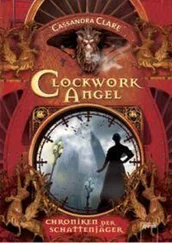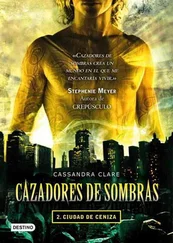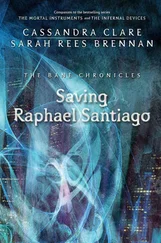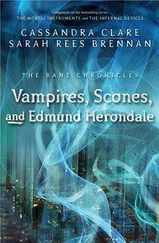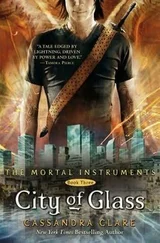“Jem!” she cried again, and when he did not look up, she strode across the room and wrenched the bow out of his hand. “Jem, stop ! Your violin—your lovely violin—you’ll ruin it.”
He looked up at her. His pupils were enormous, the silver of his eyes only a thin ring around the black. He was breathing hard, his shirt open at the neck, sweat standing out on his collarbones. His cheeks were flushed. “What does it matter?” he said in a voice so low it was almost a hiss. “What does any of it matter? I’m dying. I won’t outlast the decade. What does it matter if the violin goes before I do?”
Tessa was appalled. He never spoke like this about his illness, never.
He stood up and turned away from her, toward the window. Only a little moonlight found its way into the room through the fog; there seemed to be shapes visible in the white mist pressed against the window—ghosts, shades, mocking faces. “You know it is true.”
“Nothing is decided.” Her voice shook. “Nothing is inevitable. A cure—”
“There’s no cure.” He no longer sounded angry, just detached, which was almost worse. “I will die, and you know it, Tess. Probably within the next year. I am dying, and I have no family in the world, and the one person I trusted more than any other made sport of what is killing me.”
“But, Jem, I don’t think that’s what Will meant to do at all.” Tessa leaned the bow against the footboard and moved closer to him, tentatively, as if he were an animal she was fearful of startling. “He was just trying to escape. He is running from something, something dark and awful. You know he is, Jem. You saw how he was after—after Cecily.”
She stood just behind him now, close enough to reach out and touch him tentatively on the arm, but she did not. His white shirt was stuck to his shoulder blades with sweat. She could see the Marks on his back through the fabric. He dropped the violin almost carelessly onto the trunk and turned to face her. “He knows what it means to me,” he said. “To see him even toy with what has destroyed my life—”
“But he wasn’t thinking of you—”
“I know that.” His eyes were almost all black now. “I tell myself he’s better than he makes himself out to be, but, Tessa, what if he isn’t? I have always thought, if I had nothing else, I had Will. If I have done nothing else that made my life matter, I have always stood by him. But perhaps I shouldn’t.”
His chest was rising and falling so fast, it alarmed her; she put the back of her hand to his forehead and nearly gasped. “You’re burning up. You should be resting—”
He flinched away from her, and she dropped her hand, hurt. “Jem, what is it? You don’t want me to touch you?”
“Not like that,” he flared, and then flushed even darker than before.
“Like what?” She was honestly bewildered; this was behavior she might have expected from Will, but not from Jem—this mysteriousness, this anger.
“As if you were a nurse and I were your patient.” His voice was firm but uneven. “You think because I am ill that I am not like—” He drew a ragged breath. “Do you think I do not know,” he said, “that when you take my hand, it is only so that you can feel my pulse? Do you think I do not know that when you look into my eyes, it is only to see how much of the drug I have taken? If I were another man, a normal man, I might have hopes, presumptions even; I might—” His words seemed to catch, either because he realized he had said too much or because he had run out of breath; he was gasping, his cheeks flushed.
She shook her head, feeling her plaits tickle her neck. “This is the fever speaking, not you.”
His eyes darkened, and he began to turn away from her. “You can’t even believe I could want you,” he said in a half whisper. “That I am alive enough, healthy enough—”
“No—” Without thinking, she caught at his arm. He stiffened. “James, that isn’t at all what I meant—”
He curled his fingers around her hand where it lay on his arm. His own scorched her skin, as hot as fire. And then he turned her and drew her toward him.
They stood face-to-face, chest to chest. His breath stirred her hair. She felt the fever rising off him like mist off the Thames; sensed the pounding of the blood through his skin; saw with a strange clarity the pulse at his throat, the light on the pale curls of his hair where they lay against his paler neck. Prickles of heat ran up and down her skin, bewildering her. This was Jem—her friend, as steady and reliable as a heartbeat. Jem did not set her skin on fire or make the blood rush fast inside her veins until she was dizzy.
“Tessa,” he said. She looked up at him. There was nothing steady or reliable about his expression. His eyes were dark, his cheeks flushed. As she raised her face, he brought his down, his mouth slanting across hers, and even as she froze in surprise, they were kissing. Jem. She was kissing Jem. Where Will’s kisses were all fire, Jem’s were like pure air after a long time of being closed up in the airless dark. His mouth was soft and firm; one of his hands circled the back of her neck gently, guiding her mouth to his. With his other hand he cupped her face, running his thumb gently across her cheekbone. His lips tasted of burned sugar; the sweetness of the drug, she guessed. His touch, his lips, were tentative, and she knew why. Unlike Will, he would mind that this was the height of impropriety, that he should not be touching her, kissing her, that she should be pulling away.
But she did not want to pull away. Even as she wondered at the fact that it was Jem she was kissing, Jem making her head swim and her ears ring, she felt her arms rise as if of their own accord, curving around his neck, drawing him closer.
He gasped against her mouth. He must have been so sure she would push him away that for a moment he went still. Her hands glided over his shoulders, urging him with gentle touches, with a murmur against his lips, not to pause. Hesitantly he returned her caress, and then with greater force—kissing her again and again, each time with increasing urgency, cupping her face between his burning hands, his thin violinist’s fingers stroking her skin, making her shiver. His hands moved to the small of her back, pressing her against him; her bare feet slipped on the carpet, and they half-stumbled backward onto the bed.
Her fingers wound tightly in his shirt, Tessa drew Jem down onto her, taking the weight of him onto her body with the feeling that she was being given back something that had belonged to her forever, a bit of her that she had missed without knowing she was missing it. Jem was light, hollow-boned like a bird and with the same racing heart; she ran her hands through his hair, and it was as soft as she had always in her most buried dreams thought it would be, like pinfeathers between her fingers. He could not seem to stop running his hands over her in wonder. They traced their way down her body, his breath ragged in her ear as he found the tie of her dressing gown and paused there, with shaking fingers.
His uncertainty made Tessa’s heart feel as if it were expanding inside her chest, its tenderness big enough to hold them both inside it. She wanted Jem to see her, just as she was, herself, Tessa Gray, with none of the Change on her. She reached down and undid the tie, sliding the dressing gown off her shoulders so that she was revealed before him in only her white batiste nightgown.
She looked up at him, breathless, shaking her loosened hair out of her face. Propping himself over her, he gazed down, and said again, huskily, what he had said in the carriage before, when he had touched her hair. “Ni hen piao liang.”
Читать дальше

